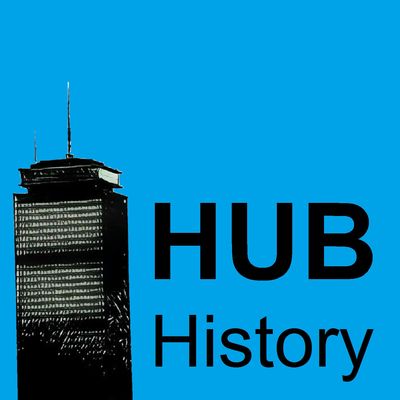Where two history buffs go far beyond the Freedom Trail to share our favorite stories from the history of Boston, the hub of the universe.
http://HUBhistory.com
The Bloody Flux of 1775, with Judy Cataldo (episode 181)
In the late summer of 1775, a terrible epidemic struck Boston, and much of New England. As the Revolutionary War heated up, and the siege of Boston reached its peak, both armies faced an invisible enemy. Judy Cataldo will join us on the show this week to explain the disease that was known at the time as the bloody flux. Today, we might know it better by the name dysentery or shigella. The bloody flux was a diarrheal disease that took a terrible toll on the region’s children, but now it’s barely remembered, as it’s overshadowed by a smallpox outbreak of the same year.
Please check out the transcript and full show notes at: http://HUBhistory.com/181/
And support the show on Patreon.
The Bloody Flux of 1775Judy Cataldo is an independent scholar and a volunteer with several local organizations, including Minuteman National Park, since 1974. Judy has either attended or presented at every History Camp Boston but one, and she was scheduled to present this year in March, until our current circumstances forced a delay. She’s also a historical spinner and a reenactor with the Westford Colonial Minutemen.
Check out Judy’s blog for additional resources about researching the bloody flux in your town, or read her guest post on JL Bell’s blog.
Put yourself in the shoes of Abigail Adams as she negotiates the grief and fear of the 1775 Bloody flux:
- August 10/11 “The joy is overclouded, and the Day is darkened by the mixture of Grief and the Sympathy I feel for the loss of your Brother, cut off in the pride of life and the bloom of Manhood!”
- September 8/10 “Our House is an hospital in every part, and what with my own weakness and distress of mind for my family I have been unhappy enough. And such is the distress of the neighbourhood that I can scarcly find a well person to assist me in looking after the sick.”
- October 1 “Have pity upon me, have pity upon me. Oh! thou my beloved for the Hand of God presseth me sore. Oh, my bursting Heart! My Dear Mother has Left me, this day about 5 oclock she left this world for an infinitely better. Tis a dreadful time with this whole province. Sickness and death are in almost every family. I have no more shocking and terible Idea of any Distemper except the Plague than this.”
- October 9 “I have just returnd from attending Patty to the Grave. We have great sickness yet in the Town; she made the fourth Corpse that was this day committed to the Ground. We have many others now so bad as to dispair of their lives. The Throat Distemper as well as the Dysentery prevails in this and the Neighbouring Towns.”
Since this is our Patriots Day episode, our pick for the Boston Book Club this week is The Road to Concord: How Four Stolen Cannon Ignited the Revolutionary War. It was written by past podcast guest JL Bell, the local historian and writer behind boston1775.net, where he writes a fresh story about the Revolutionary era in Boston every single day. The book details the cat and mouse game that Colonial officials and redcoats played against the revolutionary shadow government in Massachusetts over four small brass cannons that had previously belonged to militia units in Boston. It was intelligence indicating that some of these cannons were in Concord that led General Thomas Gage to order his men to march into the countryside 245 years ago today. Here’s how a reviewer for the US Army’s Military Review Journal describes the book:
Between the fall of 1774 and spring of 1775, there was an arms race between the patriots of the Massachusetts Colony and the British army. Both sides were pursuing possession of all artillery in the region. Unlike muskets, artillery had no use other than for war; it was a weapon of war, and there was a sensing that war was on the horizon. Bell documents that just in September, all publicly owned cannons in Boston and Charlestown had been taken by one side or the other, and in some cases, taken back.
Gage was not only attempting to secure material of war, but he was also determined to locate the cannon and discount the embarrassment of losing the cannon in the first place. Through various sources, he believed the cannon to be located in Concord. Bell posits it was on this seventeen-mile journey to Concord to regain control of the artillery that a skirmish between approximately 250 British soldiers and 70 colonists fueled the start of the American Revolution.
Upcoming EventThomas Whalen is an associate professor of social science at BU. He will be giving a book talk via the Massachusetts Historical Society on Friday, April 24 about his book Kooks and Degenerates On Ice: Bobby Orr, the Big Bad Bruins, and the Stanley Cup Championship that Transformed Hockey. Here’s how the MHS describes it.
During the 1969–1970 season, the “Big, Bad Bruins,” led by the legendary Bobby Orr, brushed off their perennial losing ways to defeat the St. Louis Blues in the Stanley Cup Finals for their first championship in 29 years. Thomas J. Whalen brings to life all the colorful personalities and iconic players from this Stanley Cup-raising team. Whalen situates this winning season into its historical context as the United States struggled with issues of war, race, politics, and class, making his book a must-read for sports enthusiasts, hockey fans, and those interested in twentieth-century American history.
The talk begins at 2pm. If you’re interested in joining, you’ll need to register to get connection details.
